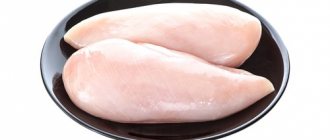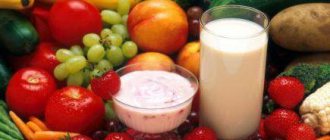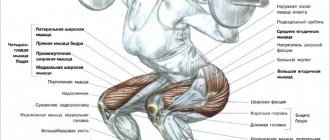Why do you need meat?
As everyone probably knows, meat is one of the main sources of protein for humans.
Of course, all proteins involved in metabolism and used for the construction of tissues are synthesized by the body itself, so the question “why do you need protein (or protein products) in the diet?” contains a rational grain. But the fact is that proteins are very complex organic substances and synthesizing them from the simplest components, as they say “from scratch,” is very difficult and costly for the body. Therefore, the human body is accustomed to using protein substances obtained from food, disassembling them into amino acids in the digestive tract, and using the resulting substances to create its own proteins. And with a lack of protein products in the diet, the processes of protein synthesis in the body slow down. Literally all processes suffer - hematopoietic function, growth of muscle, connective and other tissues, production of enzymes and hormones, etc. The result may be not only a slowdown in development, but also the occurrence of various pathological conditions and diseases (for example, anemia, that is, anemia, which often affects adherents of a vegetarian diet). Therefore, even in order to simply stay healthy, a person must receive a sufficient amount of protein from food. Another important point concerns essential amino acids. Our body cannot synthesize some amino acids necessary for building its proteins. He must get them from food. And these essential amino acids are present in full in animal proteins (not only in meat, but also in eggs, fish, dairy and seafood, etc.). But in almost all plant foods (even those rich in protein) these amino acids are either absent or their amount is noticeably less than necessary. Because of this, plant proteins are often called “incomplete.”
Protein is a building block of the body
It's no secret that protein is needed to build muscle mass in a person. There are corresponding norms for the daily protein requirement in bodybuilding per 1 kg of body weight:
- 1.4 g is enough to maintain muscle mass;
- for muscle building – 4 g;
- to create a relief figure – 2.2 g;
- for the purpose of losing weight and burning fat -2.3 g.
Meat is an excellent source of protein, so it should be included in sports nutrition. It is important to eat white meat, chicken and turkey; beef and lamb are considered healthy. Pork should also be present in a bodybuilder's diet. Unless you need to choose it with special responsibility, paying attention to its fat content. Loin or tenderloin is considered lean. You can also purchase carbonade or a spatula.
Points for and against"
Not everyone eats meat. Some people (for example, vegetarians) refuse meat for ideological reasons. The main arguments in favor of meat are the following:
1. Meat (and other animal products) is a well-balanced product, which contains all the nutritional components necessary for humans in almost ideal proportions (primarily the amino acid composition of animal proteins, as well as fats, carbohydrates, microelements, etc. .).
2. Meat is generally one of the easiest (and relatively inexpensive) sources of protein. An attempt to replace meat with food of equally complete composition, but of plant origin, will result in significant difficulties and considerable expenditure of time and money, even though plant products are on average cheaper than meat.
The following arguments are usually made against eating meat:
1. Meat foods contain more carcinogens and other harmful substances (cholesterol).
2. Meat contains few vitamins.
3. Meat food leads to excess weight and aggressiveness.
There is a rational grain in these arguments, but it is easy to notice that the first argument (and partly the third) is based not so much on the effects of eating meat, but on the effects of abusing meat foods, especially fatty, fried, etc. If we consider high-quality, well-cooked (stewed or baked) lean meat, then its composition may contain much less harmful substances than, say, plant products grown with the use of chemical fertilizers, pesticides, herbicides, etc. The second argument is easily dismissed by the opportunity to eat vegetables and fruits, which is not hampered by the presence of meat dishes in the diet. And finally, the irritability of people who eat meat may not be caused by meat as such, but by improper processing of it, causing health problems, or other life circumstances (fatigue, stress, etc.). In addition, one cannot discount the fact that testosterone production is largely dependent on meat consumption. And testosterone, among other effects, has increased activity and aggressiveness. And the notorious “peacefulness” of people who have adopted vegetarianism can be largely caused by a simple drop in their testosterone levels.
We will not consider purely moral arguments against eating meat, since this is too far beyond the scope of this article.
Composition, calorie content and properties of jellied meat
Having analyzed the composition of jellied meat into its components, nutritionists were able to determine the beneficial and harmful properties of the dish. Despite the fact that the meat and broth for the product are cooked for a very long time, the final product contains a lot of vitamins, minerals and other ingredients important for the functioning of the body.
- The abundance of B vitamins has a positive effect on the composition of the blood and the activity of the nervous system.
- The amino acid lysine promotes calcium absorption and resists viruses.
Tip: Some families have a tradition of leaving some of the broth and eating it while still warm. This should not be done, because this composition contains too much fat. Once the mass hardens, the shape of these potentially harmful ingredients changes and no longer poses a danger.
- Polyunsaturated fatty acids increase the functionality of the nervous system.
- The dish contains glycine. Its benefits to the body are manifested in the form of stimulation of brain cells. This leads to the elimination of signs of irritation and fatigue.
- The abundance of collagen has a positive effect on the texture of the skin, it becomes denser and more elastic. At the same time, toxins are removed from the tissues, which leads to the cleansing of the epidermis from unpleasant defects. Collagen is also necessary to maintain youthful joints, cartilage and ligaments.
These are the universal properties of jellied meat. Depending on the set of components, the list of its useful qualities can increase significantly. The main thing is not to deviate from the rules for preparing the composition and use only the freshest and highest quality products for this.
Is it possible to do without meat at all?
But why meat? Maybe you can get protein from other foods? Yes, you can get protein from other foods. But, as already mentioned, there are a number of amino acids that are noticeably worse represented in plant proteins than in animal proteins. It would be possible to eat fish, eggs and dairy products instead of meat, but vegetarians often refuse all animal products, including dairy and eggs. A lack of essential amino acids and iron, found in excess in meat, often leads vegetarians to anemia, asthenia and other health problems. Therefore, those who are forced to give up meat for ideological or medical reasons (for example, an allergy to animal proteins occurs, and is not so rare), will have to find other sources of necessary substances.
The easiest way is to replace meat with other types of animal foods - fish, eggs and dairy products. If this is not possible, then you will have to combine plant foods with a high protein content in order to equalize their amino acid composition with essential amino acids, or even take specialized nutritional supplements (amino acid and vitamin-mineral complexes).
Simply giving up meat and not changing anything else will not work. In this case, firstly, you will have to say goodbye to sports, and, secondly, with a high degree of probability, you will have to face health problems in the near future.
Beef in soy sauce
To prepare this spicy dish we will need:
— 400 grams of lean beef; - 3 cloves of garlic; - 3 tablespoons of soy sauce; - a small head of ginger; - 1 chili pepper; — 300 grams of green beans; - salt, pepper, olive oil, spices - to taste. First, the beef should be cut into thin slices. Place the chopped beans in boiling water, cook the vegetable for 3 minutes, then drain the boiling water and place them in cold water.
After this, you need to get a deep frying pan and put it on medium heat. Add oil, garlic and ginger to it, and then, as soon as the aroma of garlic is heard in the kitchen, add the meat and fry it for a few minutes until cooked. Finally, add beans and chili peppers to the beef and simmer the dish for a few more minutes.
How to replace meat in your diet?
As already mentioned, it is best to replace meat with other sources of animal proteins - eggs, fish and cottage cheese. Plant products with a high protein content are also good substitutes for meat: legumes (peas, beans, lentils, soybeans), some grains (buckwheat, rice, oats, pearl barley), nuts and mushrooms.
But it is necessary to remember that nuts contain a large amount of fat (up to 50%), and grains and legumes contain carbohydrates. Mushrooms contain difficult-to-digest proteins, in particular due to the connection of mushroom protein with chitin, so their nutritional value is lower than that of meat, and the load on the digestive tract is greater.
In general, when talking about plant proteins, one should take into account not only the lack of certain amino acids in them, but also the presence of substances that slow down absorption, for example, blocking enzymes that break down protein. All this leads to a decrease in the nutritional value of plant proteins, and even when their amino acid profile is equalized, more of such products are required to extract the required amount of protein.
Considering all that has been said, the situation can be helped by additional intake of individual substances, for example, as part of an amino acid complex.
What kind of meat can an athlete eat?
Meat not only has an optimal amino acid composition, but also contains a number of other very useful substances, the content of which varies in different types of meat. For example, iron and creatine, which are more abundant in red meat.
Another important selection criterion is the amount of fat. Lean meat is more beneficial for humans (especially athletes). For this reason, pork and lamb are eliminated, and lean beef, rabbit and poultry (especially breasts) come to the fore.
When choosing meat, you should give preference to fresh meat supplied by serious companies that undergo regular inspections by regulatory authorities. In this case, the likelihood of running into meat with a high content of harmful substances will be much lower. It is desirable that the meat be from animals whose diet is based on natural food, but, unfortunately, this is quite rare and costs much more than usual. But meat from serious suppliers is at least checked for compliance with food and sanitary standards.
Meat eaten as food must be cooked, since it is not known exactly what microorganisms it might contain, and there are many stages at which they could get on the surface of the meat during its long journey from the farm to your kitchen.
Among culinary processing methods, it is necessary to give preference to gentle options - boiled, stewed and baked meat is much better than fried. Salt and spices should be kept to a minimum, since in this case the task is to saturate the muscles (and other body tissues) with the necessary amino acids, and not to satisfy spoiled taste buds.
It is advisable not to combine meat with foods containing large amounts of carbohydrates (especially simple ones) - bread, potatoes, etc. But vegetables (in the form of salad) or buckwheat will be just right.
The benefits of jellied pork
Most often, people are interested in the benefits of jellied meat made from pork. This is a rather fatty product, so the dish from it turns out to be satisfying and nutritious. Its taste is pleasant and rich, the broth is thick and clear.
Beneficial properties of pork jellied meat:
- The body is saturated with vitamins and minerals, which eliminates the likelihood of developing a deficiency of these elements.
- Pig meat contains myohemoglobin. This substance is responsible for transporting oxygen between organs and muscles. Its intake into the body improves the functioning of the heart and blood vessels.
- Pork jellied meat is especially useful for men. It starts the prevention of infectious diseases in the genital area, prostatitis, and has a beneficial effect on potency.
- If you add a little fat or lard to a dish, it will help fight depression and overwork. The presence of garlic and black pepper gives the mass antibacterial properties.
The authors of the portal “Polzateevo” never tire of reminding that the listed results can only be counted on if you use a natural product. Those dishes that are sold in ready-to-eat stores cannot please you with either taste or healing effects.










